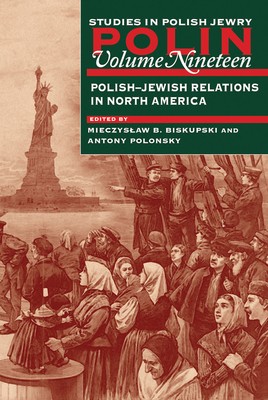
- We will send in 10–14 business days.
- Publisher: Littman Library of Jewish Civilization in Association with Liverpool University Press
- Year: 2006
- Pages: 653
- ISBN-10: 1874774978
- ISBN-13: 9781874774976
- Format: 15.8 x 22.9 x 5.1 cm, minkšti viršeliai
- Language: English
- SAVE -10% with code: EXTRA
Polin: Studies in Polish Jewry Volume 19 (e-book) (used book) | bookbook.eu
Reviews
Description
Poland today is a very different country from the Poland of the past, yet attitudes inherited from the past continue to affect Polish-Jewish relations in the present. In Poland itself, now a free society, memories of the Jewish place in Poland's history, long suppressed by communism, are being re-evaluated. In America the attitudes that had divided the two sides in the Old Country seemed for a long time to be becoming more entrenched. This volume-probably the first comprehensive study of Polish-Jewish relations in North America-explores how this situation came about, and also considers the efforts being made to put the resentments caused by past conflicts to one side as the influences long dominant in the Polish-Jewish relationship in North America begin to lose their formative power. The contributors deal boldly with matters at the heart of the relationship. There is an attempt to quantify the attitudes of both sides to a number of key aspects of the Holocaust, and fascinating
questions are raised about how the Holocaust has distorted the perceptions that Poles and Jews have of each other, and why the Holocaust remains a problem in Polish-Jewish relations.
on what has linked Poles and Jews in their long history. As in earlier volumes of Polin, substantial space is given, in 'New Views', to recent research in other areas of Polish-Jewish studies.
EXTRA 10 % discount with code: EXTRA
The promotion ends in 22d.05:03:05
The discount code is valid when purchasing from 10 €. Discounts do not stack.
- Publisher: Littman Library of Jewish Civilization in Association with Liverpool University Press
- Year: 2006
- Pages: 653
- ISBN-10: 1874774978
- ISBN-13: 9781874774976
- Format: 15.8 x 22.9 x 5.1 cm, minkšti viršeliai
- Language: English English
Poland today is a very different country from the Poland of the past, yet attitudes inherited from the past continue to affect Polish-Jewish relations in the present. In Poland itself, now a free society, memories of the Jewish place in Poland's history, long suppressed by communism, are being re-evaluated. In America the attitudes that had divided the two sides in the Old Country seemed for a long time to be becoming more entrenched. This volume-probably the first comprehensive study of Polish-Jewish relations in North America-explores how this situation came about, and also considers the efforts being made to put the resentments caused by past conflicts to one side as the influences long dominant in the Polish-Jewish relationship in North America begin to lose their formative power. The contributors deal boldly with matters at the heart of the relationship. There is an attempt to quantify the attitudes of both sides to a number of key aspects of the Holocaust, and fascinating
questions are raised about how the Holocaust has distorted the perceptions that Poles and Jews have of each other, and why the Holocaust remains a problem in Polish-Jewish relations.
on what has linked Poles and Jews in their long history. As in earlier volumes of Polin, substantial space is given, in 'New Views', to recent research in other areas of Polish-Jewish studies.


Reviews